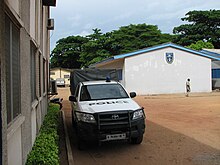
The Armed Forces of Gabon or the Gabonese Defense and Security Forces is the national professional military of the Republic of Gabon, divided into the Army, Air Force, Navy, and a National Gendarmerie, consisting of about 5,000 personnel. The armed forces includes a well-trained, well-equipped 1,800-member guard that provides security for the President of Gabon.
The politics of Saint Pierre and Miquelon take place in the framework of a parliamentary representative democratic French overseas collectivity, whereby the President of the Territorial Council is the head of government, and of a multi-party system. Executive power is exercised by the government.

The Republican Guard is part of the French National Gendarmerie. It is responsible for special security duties in the Paris area and for providing guards of honour at official ceremonies of the French Republic.

The Compagnies républicaines de sécurité, abbreviated CRS, are the general reserve of the French National Police. They are primarily involved in general security missions, but the task for which they are best known is crowd and riot control. The DCCRS has seven units: in Paris, Lille, Rennes, Bordeaux, Marseille, Lyon and Metz.

The National Police, formerly known as the Sûreté nationale, is one of two national police forces of France, the other being the National Gendarmerie. The National Police is the country's main civil law enforcement agency, with primary jurisdiction in cities and large towns. By contrast, the National Gendarmerie has primary jurisdiction in smaller towns, as well as in rural and border areas. The National Police comes under the jurisdiction of the Ministry of the Interior and has about 145,200 employees. Young French citizens can fulfill their mandatory service in the police force.

Law enforcement in France has a long history dating back to AD 570 when night watch systems were commonplace. Policing is centralized at the national level. Recently, legislation has allowed local governments to hire their own police officers which are called the police municipale.

The National Gendarmerie is one of two national law enforcement forces of France, along with the National Police. The Gendarmerie is a branch of the French Armed Forces placed under the jurisdiction of the Ministry of the Interior, with additional duties from the Ministry of Armed Forces. Its responsibilities include policing smaller towns, suburbs and rural areas, crowd and riot control, criminal investigation, including cybercrime. By contrast, the National Police is a civilian law enforcement agency that is in charge of policing cities and larger towns. Because of its military status, the Gendarmerie also fulfills a range of military and defence missions. The Gendarmerie has a strength of around 102,269 people.
Like many other countries with a French colonial heritage, law enforcement in Burkina Faso is a responsibility primarily shared by the gendarmerie and the police.

The principle law enforcement agency in Burundi is the National Police of Burundi. The police falls within the jurisdiction of the Ministry of Public Security. It is separate from the National Intelligence Service (SNR), the state intelligence agency.

The Gendarmerie Nationale is the national gendarmerie of Niger. The Gendarmerie Nationale are under the Niger Armed Forces and report to the Ministry of Defense. They are responsible for law enforcement in rural areas. Niger's civilian police force, the National Police, is a separate agency under the Ministry of Interior, Public Safety and Decentralization, and are responsible for policing in urban areas.
Responsibility for law enforcement in Togo is primarily shared by the Police Nationale, the civilian national police, and the paramilitary Gendarmerie nationale togolaise.

Law enforcement in the Democratic Republic of the Congo has historically been focused on furthering the state's aims with no regard for human rights. The Police nationale congolaise is the police throughout the territory of the Democratic Republic of the Congo. It was composed of between 110,000–150,000 officers as of 2010.

The Mobile Gendarmerie (GM) is a subdivision of the French National Gendarmerie whose main mission is to maintain public order and general security. Contrary to the Departmental Gendarmerie, whose jurisdiction is limited to specific parts of the territory, the Mobile Gendarmerie can operate anywhere in France and even abroad as the Gendarmerie is a component of the French Armed Forces. Although the term "mobile" has been used at different times in the 19th century, the modern Mobile Gendarmerie was created in 1921.

The National Police is the national civilian police force of Niger. The National Police are under the Ministry of Interior, Public Safety and Decentralization and report to the General Directorate of National Police. They are responsible for law enforcement in urban areas, the protection of government buildings and institutions, and the security of government leaders. Niger's gendarmerie, the Gendarmerie Nationale, is a separate agency under the Niger Armed Forces, and are responsible for policing in rural areas.

The National Defence Medal is a French military decoration. It was created by Charles Hernu, Minister of Defence and established by decree on 21 April 1982. It rewards particularly honourable service rendered by military personnel for their participation in operational activities. The medal has three levels: Gold, Silver and Bronze.

The Tunisian National Guard is the national gendarmerie force of the Republic of Tunisia and separated from the Tunisian Armed Forces.
The Gendarmerie nationale Togolaise is a branch of the Togolese Armed Forces. Its 2,710 gendarmes protect people and property in rural areas, control roads and communications and contribute to provide assistance to the population in emergencies.

The National Gendarmerie of Gabon is the national police force of Gabon responsible for law enforcement in Gabon. It is under the direct command of the President of Gabon. The Gendarmerie is also in charge of the Gabonese Republican Guard.
The Maréchaussée were corps of soldiers in the armies of France initially put in charge of military policing and justice during the Middle Ages, and later extended to civilian responsibilities. They gradually coalesced into a police force with jurisdiction over the whole population on almost the entire territory of France. They retained powers of extraordinary justice until the French Revolution.














